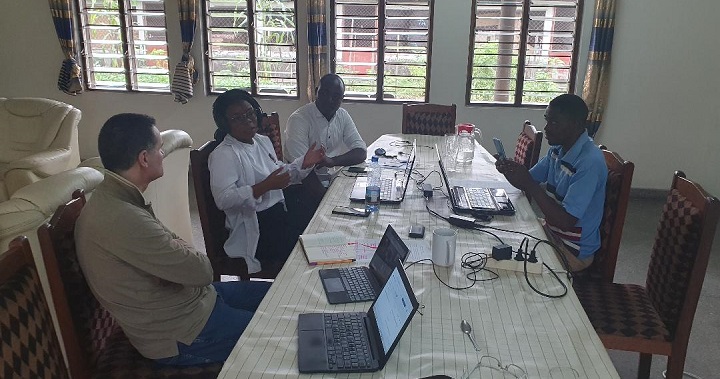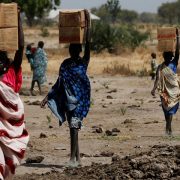
English version below
Il progetto di una «internazionalizzazione» dehoniana di SettimanaNews, attraverso la creazione di sinergie con realtà e persone legate alla Congregazione, è stato fin dall’inizio del suo mandato un’attenzione particolare del superiore generale p. Carlos Luis Suarez scj.
Immaginato già verso la fine del 2019, è stato messo in stand-by dalla pandemia. Pausa, questa, che ha rappresentato certo una piccola cosa rispetto all’esperienza globale di un mondo che, per la prima volta nell’epoca moderna, si è quasi completamente fermato.
Ma questo tempo fermo è stato anche quello che un gruppo di giovani universitari congolesi, animati dalla presenza di due confratelli (Yanick e Victoire), ha colto per far nascere la rivista mensile Je écris, Je crie. Due i poli intorno a cui ruota il lavoro culturale di questa giovane rivista africana: quello della pace, come compito che deve essere assunto dai popoli del continente; e quello di una nuova autocomprensione della coscienza africana – capace di gettarsi oltre lo stereotipo della vittima coloniale e degli interessi permanenti di potenze straniere, per diventare attore primo del proprio destino.
Fine dell’occidentalismo
Come i lettori e le lettrici di SettimanaNews avranno potuto notare, da alcuni mesi è iniziata una significativa collaborazione che ha intersecato progetti e letture delle due redazioni. Per noi è stata la possibilità di offrire un servizio di informazione sull’Africa interno alle vicende del continente, dove gli eventi sono toccati con mano autoctona e trasmessi con uno stile e una sensibilità che ha il gusto della terra in cui essi avvengono.
Ma è stata, anche e soprattutto, una occasione di apprendimento: abbiamo iniziato a imparare a guardare all’Africa con occhi non nostri, lasciando che queste letture africane plasmassero e trasformassero il nostro occhio occidentale.
La tentazione coloniale di sapere sempre meglio e di offrire comunque l’interpretazione più adeguata, che attraversa anche gli animi più attenti e disponibili della cultura occidentale, è stata messa in crisi dallo slancio e dal coraggio con cui un manipolo di giovani congolesi ha affermato il diritto di riappropriarsi del proprio continente, della sua storia, degli errori commessi dai popoli africani.
Kinshasa
Questo il bagaglio con cui, un mercoledì di gennaio, ci siamo imbarcati per Kinshasa – per incontrare e lavorare insieme alla redazione di Je écris, Je crie. È passato quasi un mese da quel giorno, ma ancora fatichiamo a trovare le parole per dire dell’impatto con questa megalopoli africana, con le sue atmosfere, con immagini di vissuti che accalcano strade e piazze polverose che ci hanno quasi sopraffatto.
Gli appuntamenti di lavoro con i giovani giornalisti africani, le chiacchierate informali nelle sale della comunità dehoniana che ci ha ospitato con squisita gentilezza, la visita alla rivista dei padri comboniani Afriquespoire, ci hanno come salvato dall’eccesso di impressioni a cui eravamo esposti ogni volta che, a piedi o in cinque su un Ape traballante, attraversavamo le vie della capitale congolese.
Sono stati giorni di lavoro intenso, che hanno creato una comunità redazionale tra i giovani di Je écris, Je crie e noi. E, forse, questo è l’esito più importante dei giorni trascorsi a Kinshasa – al di là dei temi che abbiamo trattato e delle prospettive che abbiamo condiviso.
In un continente dove le differenze, di etnia, di lingua, di culture, sono ancora fortemente divisive, ritrovarsi insieme uniti proprio da ciò che ci distingue (dove la differenza diventa arricchimento della propria visione e, al tempo stesso, istanza critica di una sua riformulazione) è stato qualcosa che ha avuto per i nostri colleghi africani un valore che noi occidentali riusciamo appena a percepire.

Dalla spiritualità ricevuta alla spiritualità praticata
Una spiritualità, un carisma, non è fatta di parole ma di pratiche – in cui ci si può riconoscere vicendevolmente senza dover abbandonare la propria storia, la propria terra, il proprio vissuto specifico. Ce lo hanno richiamato proprio i confratelli congolesi, che hanno sentito questi giorni di lavoro insieme, questa genesi di una comunità sui generis all’interno della Congregazione, come l’esplicitazione di quel motto che p. Dehon ha lasciato a tutte le generazioni dehoniane a venire – ut unum sint.
Una comunità che coinvolge non solo dehoniani, ma anche giovani donne africane, studenti universitari, suore, laici e laiche – su entrambi i lati di questa nuova redazione allargata.
Carisma e spiritualità non sono dati per ammuffire negli spazi ristretti di una Congregazione, ma per il bene della Chiesa e per la destinazione del mondo. È su questa base condivisa che abbiamo iniziato non solo a immaginare, ma anche a praticare una nuova esperienza di comunità dehoniana. Incrociando metodi di lavoro informativo, ponendo domande più importanti di qualsiasi sbrigativa risposta, rileggendo le reciproche storie delle due riviste come segni di una spiritualità dehoniana che si espande come cura e lettura delle vicende delle Chiese, delle genti, dei popoli.
Per Dehon l’informazione rappresentava una pratica eminente di formazione alla configurazione di un mondo e una storia umana toccati dalla tenerezza di Dio e dalla affidabilità della sua dedizione per ogni essere umano. Un servizio di informazione che guarda alla Chiesa globale, al mondo di oggi, alle speranze e ai drammi di paesi dimenticati perché fa comodo alle potenze mondane.
È su queste armoniche che, come SettimanaNews e Je écris, Je crie, vorremmo creare una piattaforma informativa che è comune, nella radice spirituale, e distinta, nei modi di lettura degli eventi. Per raccontare le cose e le vicende delle Chiese con gli occhi che le vivono in prima persona – senza sovraimpressioni coloniali e senza imposizioni culturali.
Si tratta di dire la spiritualità dehoniana parlando di altro: nel modo di leggere vicende di fede radicate in contesti; di esporre posizioni di Chiesa che diventano intellegibili solo se narrate e comprese dentro la storia e il popolo che le generano; di scegliere cosa narrare di una cultura, di fatti politici, di ingiustizie sociali ed economiche. La spiritualità dehoniana in esercizio, quindi – che sente, sceglie e narra la storia di tutti (degli uomini e delle donne, delle società, delle Chiese e delle religioni).
Allargamenti
Alla giovane redazione di Je écris, Je crie dobbiamo molto – in particolare di essere stata la prima compagna per la fondazione di un nuovo genere di comunità all’interno della Congregazione dehoniana.
Ogni esperienza di fondazione dice una nascita, possibile anche per chi è come Abramo – avanzato negli anni, vedendo oramai approssimarsi la fine dei giorni consegnati alla sua vita e alla sua fede. Per SettimanaNews, espressione di una Provincia dehoniana entrata nel tempo di Abramo, questo vuol dire avere nuovi giorni e nuovi orizzonti – che percorreremo per un pezzo insieme ai nuovi giovani compagni di via, per poi lasciare a loro il testimone di una impresa iniziata insieme.
Questa nuova comunità redazionale è come un cucciolo nella culla, chiede accudimento e accompagnamento – anche da parte dei nostri lettori e lettrici. E chiede di non rimanere figlia unica.
Presto ci rimetteremo in viaggio, per calarci nella realtà di un altro grande continente – l’America Latina; e, più precisamente, il Venezuela. Perché ci piacerebbe riuscire a creare una comunità informativa che dica il mondo e la Chiesa stando sui bordi dei margini della Chiesa e del mondo.
The internationalization of SettimanaNews, through synergies with entities and people related to the Dehonian Congregation, has been a particular focus of Superior General Fr. Carlos Luis Suarez since the beginning of his term.
Envisioned as early as 2019, this project was put on standby by the pandemic. A pause that was a small thing compared to the global experience of a world that, for the first time in modern times, came to an almost complete standstill.
But this standstill was also the occasion sized by a group of young Congolese university students, animated by the presence of two confreres (Yanick and Victoire), to give birth to the monthly magazine Je écris, Je crie.
The cultural work of this African magazine pivots around two poles. First, the quest for peace in the continent – as a task that must be owned by the African people themselves. Second, shaping a new self-understanding of African consciousness – away from the stereotype of the colonial victim as subjugated to the interests of foreign powers. What these young editors make clear with their articles, it is that African peoples must become agent of their own destiny.
The End of Occidentalism
As readers of SettimanaNews may have noticed, a significant collaboration that intersects projects and perspectives of the two editorial staffs began a few months ago. For us in Italy, it has been the opportunity to offer to our readers a news service shaped from within the African continent. A news service where events are touched with an indigenous hand, and they are conveyed with a style and sensitiveness that has the flavor of the land where they take place.
But for us at SettimanaNews it was, also and above all, a learning experience. We began to learn to look at Africa with eyes not our own, letting these African interpretations of African issues shape and transform our Western eyes.
The colonial temptation to always know better, implying that the most adequate interpretation of African questions lies on our side, was challenged by the momentum and courage with which a handful of young Congolese asserted their right to make the continent again their own – with its history, and also with the mistakes made by African people over the decades.
Kinshasa
This was the luggage with which, one Wednesday in January, we boarded for Kinshasa – to meet and work together with the editorial team of Je écris, Je crie. Nearly a month has passed since that day, but we still struggle to find words for telling the impact with this African megalopolis, with its surrounding, with images of life and poverty crowding dusty streets and squares – an experience that almost overwhelmed us.
The work meetings with the young African colleagues, the informal chats in the halls of the Dehonian community that hosted us with exquisite kindness, the visit paid to the African magazine Afriquespoir (runned by the Comboniani Missionaries), saved us from the overwhelming impressions to which we were exposed every time we set foot in the chaotic streets of the Congolese capital.
They were days of intense work – shaping an editorial community among the youth of Je écris, Je crie and us. Perhaps, this is the most important outcome of our stay in Kinshasa – beyond the topics we covered and the perspectives we shared.
Standing on a continent where differences of ethnicity, language, cultures, are still strongly divisive, the experience to find ourselves (Africans and Italians) united by the very thing that distinguishes us was something that had a value for our African counterpart that we Western people can barely perceive. The value of sharing even the differences as something that enriches one’s perspective and, at the same time, as momentum for its critical reformulation.
From Received to Practiced Spirituality
A spirituality is not made up of words but of lived practices – in which one can recognize one’s another without having to leave behind one’s own history, land, peculiar experience, and culture. We were reminded of this by our Congolese confreres, who felt these days of working together, this genesis of a new kind of community within the Dehonian Congregation, as the explication of that motto that Fr. Dehon left to Dehonian generations to come: sint unum.
This editorial community involves not only Dehonians, but also young African women, college students, sisters, lay people, and diocesan priests – on both sides of the expanded editorial staff.
Charism and spirituality are not given to molder in the confined spaces of a religious Congregation, but for the good of the whole Church as well as for the purpose of the world. It is on this shared understanding, that we have begun not only to imagine but also to practice a new Dehonian common experience. Crossing methods of journalistic work, asking each other questions in itself more important than any hasty answer, rereading the mutual histories of the two magazines – all that as sign of a Dehonian spirituality that expands beyond itself in perceiving and reporting facts concerning Churches, peoples, and nations.
According to Fr. Dehon, news service represented an eminent practice of formation in order to shape a world and human history that feels to be touched by God’s tenderness and by the reliability of his dedication to every human being. For us, it is about a news service that looks to the global Church, to our world, to the hopes and dramas of forgotten countries and peoples because it suits the worldly powers.
It is on this understanding of Dehonian spirituality that we, as SettimanaNews and Je écris, Je crie, would like to create a news platform that is common, in its spiritual root, and distinct, in its way of understanding facts and stories. We aim to report about Churches and countries through the eyes that experience them firsthand – without any colonial over-impression and cultural imposition.
We aim to say and practice our Dehonian spirituality while talking about something else. Such spirituality appears in the way of understanding events of faith rooted in contexts; in expounding Church positions that become intelligible only if they are told and understood within the history and the people who generate them; in choosing what and how to report about cultures, political questions, social and economic injustices.
A living spirituality does not need to talk about itself, but it is able of becoming the invisible lens through which Church and humans history are perceived, interpreted, and told. We live our Dehonian spirituality while telling the stories of everyone who is not us – men and women, societies and politics, Churches and religions, cultures and languages.
Abroad
To the young editors of Je écris, Je crie we owe much. Especially, we owe them being the first companions in the foundation of a new kind of community within the Dehonian Congregation.
Every founding experience tells of a birth – possible even for those aged like Abraham: advanced in years, and now seeing the end of the days given to his life and faith approaching.
For SettimanaNews, an expression of a Dehonian Province that has entered the lifetime of Abraham, this means having new horizons and new days – through which we would like to travel for a piece with our African companions, and then leave to them the baton of an enterprise that we began together.
This newly born editorial community is like a baby in the cradle – asking for care and accompaniment (not only to the Dehonian Congregation, but also to our reader). It also asks not to remain an only child.
Soon we will be on the road again, to drop into the reality of another continent: Latin America – more specifically, Venezuela. Because we would like to succeed in creating an international Dehonian news community that tells of the world as well as of the Church by standing on the edges of the Church’s and world’s margins.





